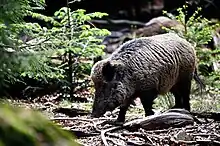парсь
Udmurt

Парсь.
Etymology
From Proto-Permic *pɔrś, from Proto-Finno-Permic *porćas, borrowed from an Indo-European language, ultimately from Proto-Indo-European *pórḱos (compare Avestan 𐬞𐬆𐬭𐬆𐬯𐬀 (pərəsa) and Latin porcus). Cognates include Finnish porsas and Erzya пурцос (purcos).
Permic cognates include Komi-Zyrian порсь (porś) and Komi-Permyak порсь (porś).
Pronunciation
- IPA(key): [ˈpärɕ]
- Rhymes: -ärɕ
- Hyphenation: парсь
Declension
Declension of парсь (soft declension)
| singular | plural | |
|---|---|---|
| nominative | парсь parś |
парсьёс parśjos |
| accusative | парсьез parśjez |
парсьёсыз parśjosyz |
| genitive | парсьлэн parślen |
парсьёслэн parśjoslen |
| dative | парсьлы parśly |
парсьёслы parśjosly |
| ablative | парсьлэсь parśleś |
парсьёслэсь parśjosleś |
| instrumental | парсьен parśjen |
парсьёсын parśjosyn |
| abessive | парсьтэк parśtek |
парсьёстэк parśjostek |
| adverbial | парсья parśja |
парсьёсъя parśjosja |
| inessive | парсьын parśyn |
парсьёсын parśjosyn |
| illative | парсье parśje |
парсьёсы parśjosy |
| elative | парсьысь parśyś |
парсьёсысь parśjosyś |
| egressive | парсьысьен parśyśjen |
парсьёсысьен parśjosyśjen |
| terminative | парсьозь parśoź |
парсьёсозь parśjosoź |
| prolative | парсьетӥ parśjeti |
парсьёсытӥ parśjosyti |
| allative | парсьлань parślań |
парсьёслань parśjoslań |
Possessive forms of парсь
1st singular possessive forms of парсь
| singular | plural | |
|---|---|---|
| nominative | парсье parśje |
парсьёсы parśjosy |
| accusative | парсьме parśme |
парсьёсме parśjosme |
| genitive | парсьелэн parśjelen |
парсьёсылэн parśjosylen |
| dative | парсьелы parśjely |
парсьёсылы parśjosyly |
| ablative | парсьелэсь parśjeleś |
парсьёсылэсь parśjosyleś |
| instrumental | парсьеным parśjenym |
парсьёсыным parśjosynym |
2nd singular possessive forms of парсь
| singular | plural | |
|---|---|---|
| nominative | парсьед parśjed |
парсьёсыд parśjosyd |
| accusative | парсьдэ parśde |
парсьёстэ parśjoste |
| genitive | парсьедлэн parśjedlen |
парсьёсыдлэн parśjosydlen |
| dative | парсьедлы parśjedly |
парсьёсыдлы parśjosydly |
| ablative | парсьедлэсь parśjedleś |
парсьёсыдлэсь parśjosydleś |
| instrumental | парсьеныд parśjenyd |
парсьёсыныд parśjosynyd |
3rd singular possessive forms of парсь
| singular | plural | |
|---|---|---|
| nominative | парсьез parśjez |
парсьёсыз parśjosyz |
| accusative | парсьзэ parśze |
парсьёссэ parśjosse |
| genitive | парсьезлэн parśjezlen |
парсьёсызлэн parśjosyzlen |
| dative | парсьезлы parśjezly |
парсьёсызлы parśjosyzly |
| ablative | парсьезлэсь parśjezleś |
парсьёсызлэсь parśjosyzleś |
| instrumental | парсьеныз parśjenyz |
парсьёсыныз parśjosynyz |
1st plural possessive forms of парсь
| singular | plural | |
|---|---|---|
| nominative | парсьмы parśmy |
парсьёсмы parśjosmy |
| accusative | парсьмэс parśmes |
парсьёсмес parśjosmes |
| genitive | парсьмылэн parśmylen |
парсьёсмылэн parśjosmylen |
| dative | парсьмылы parśmyly |
парсьёсмылы parśjosmyly |
| ablative | парсьмылэсь parśmyleś |
парсьёсмылэсь parśjosmyleś |
| instrumental | парсьенымы parśjenymy |
парсьёсынымы parśjosynymy |
2nd plural possessive forms of парсь
| singular | plural | |
|---|---|---|
| nominative | парсьды parśdy |
парсьёсты parśjosty |
| accusative | парсьдэс parśdes |
парсьёстэс parśjostes |
| genitive | парсьдылэн parśdylen |
парсьёстылэн parśjostylen |
| dative | парсьдылы parśdyly |
парсьёстылы parśjostyly |
| ablative | парсьдылэсь parśdyleś |
парсьёстылэсь parśjostyleś |
| instrumental | парсьеныды parśjenydy |
парсьёсыныды parśjosynydy |
3rd plural possessive forms of парсь
| singular | plural | |
|---|---|---|
| nominative | парсьзы parśzy |
парсьёссы parśjossy |
| accusative | парсьзэс parśzes |
парсьёссэс parśjosses |
| genitive | парсьзылэн parśzylen |
парсьёссылэн parśjossylen |
| dative | парсьзылы parśzyly |
парсьёссылы parśjossyly |
| ablative | парсьзылэсь parśzyleś |
парсьёссылэсь parśjossyleś |
| instrumental | парсьенызы parśjenyzy |
парсьёсынызы parśjosynyzy |
References
- L. E. Kirillova, L. L. Karpova, editors (2008), “парсь”, in Удмурт-ӟуч кыллюкам [Udmurt-Russian dictionary], Izhevsk: Удмуртский институт истории, языка и литературы УрО РАН, →ISBN, page 513
- Yrjö Wichmann, Toivo Emil Uotila (1987) Mikko Korhonen, editor, Wotjakischer Wortschatz [Votyak Vocabulary] (Lexica Societatis Fenno-Ugricae; Volume 21) (overall work in German), Helsinki: Suomalais-ugrilainen Seura, →ISBN, →ISSN, page 189
This article is issued from Wiktionary. The text is licensed under Creative Commons - Attribution - Sharealike. Additional terms may apply for the media files.